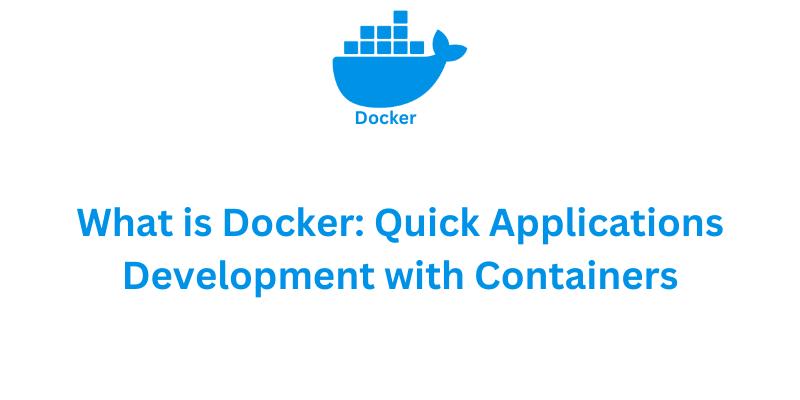What is Docker: Quick Applications Development with Containers

In the world of software development speed & efficiency are everything. Teams need to deliver applications quickly while ensuring they are reliable & can run consistently across various environments. Enter Docker–a tool that has revolutionized how developers build ship & run software.
Docker is based on the concept of containers, a technology that simplifies development & accelerates deployment. If you have ever struggled with getting an app to work on multiple systems or faced challenges managing complex dependencies Docker might be the solution you have been looking for.
Introduction to Docker
Docker packages up everything an application needs including code system tools libraries & settings into a single portable unit called a container. This container can then be moved easily between different environments whether its your local machine a colleagues laptop or a cloud server. No more "it works on my machine" headaches!
Why Docker & Why Now
Before Docker deploying applications was often a nightmare. Developers had to deal with numerous issues varying operating systems dependencies not syncing up & software that ran fine in one environment but broke in another. The process was slow cumbersome & full of inconsistencies.
Docker changes this by offering a standardized way to bundle up applications with everything they need to run. As long as the host system supports Docker the container will function exactly the same no matter where it is deployed. This ability to standardize environments makes Docker a game changer for development teams big & small.
Imagine a restaurant chef creating a perfect dish in their kitchen. Instead of giving someone just the recipe & hoping they have the right ingredients the chef sends the entire meal packaged in a container that preserves its taste & presentation no matter where it is eaten. Docker allows developers to do something similar with applications. They can package their apps so they work seamlessly regardless of where they are run.
Containers vs Virtual Machines
Many people confuse Docker containers with virtual machine VMs. While they have some similarities there are key differences that make Docker much lighter & faster.
A virtual machine requires an entire operating system to run an application meaning it uses significant resources. Think of it like carrying both the car & the suitcase. Containers on the other hand use the host systems operating system which makes them more efficient. You are essentially just carrying the suitcase not the entire car so it is easier to move & faster to start up.
This efficiency makes containers perfect for microservices architecture where an application is split into smaller manageable components. Each microservice can run in its own container making scaling testing & managing applications far simpler. It is like having separate suitcases for different outfits each neatly organized for a specific purpose but easily accessible when needed.
How Docker Transforms Application Development
Docker training enables developers to –
Accelerate Development – Containers can be set up quickly allowing developers to focus on building & testing applications rather than spending time configuring environments. Containers also start up in seconds compared to VMs which can take minutes.
Ensure Consistency Across Environments – Whether you are working on a local machine in a test environment or on production servers Docker ensures the application behaves the same way across different environments.
Simplify Collaboration – Containers can be shared easily among team members so there is no need to worry about "it works on my machine" issues. It allows developers operations teams & even non technical collaborators to work on the same version of the app without compatibility problems.
Improve Resource – Efficiency Since containers share the host machines OS & run only what is needed they are much more resource efficient than VMs. This allows you to run many more containers on a single machine or server than you could with VMs saving both time & money.
Enhance – Scalability In modern application development scalability is critical. Dockers lightweight nature means you can spin up more containers easily to handle increased demand then shut them down when they are no longer needed.
Docker in Action
While many companies benefit from Docker it is role in cloud native development is profound. With cloud platforms like AWS Microsoft Azure & Google Cloud supporting Docker teams can deploy containers at scale effortlessly. Whether youre managing a single application or thousands of microservices Docker integrates smoothly with cloud infrastructure providing seamless deployment & management.
The ability to spin up containers quickly adjust for scale & maintain consistency across platforms gives businesses flexibility to adapt to changing demands in real time. From e–commerce sites handling seasonal traffic spikes to financial institutions managing sensitive data Dockers impact is widespread & transformative.
Why You Should Care
Whether you are a student a seasoned developer or a decision maker in a tech driven organization Docker is worth understanding. For students learning Docker sets you up for success in a world where containerization is becoming the norm. For developers Docker streamlines workflows reduces errors & improves productivity. And for decision makers Docker offers a reliable cost effective solution to modern application development challenges.
Docker Containers are here to stay & Docker has proven itself as a leading platform in the containerization movement. As the demand for faster more reliable & scalable applications grows Docker is poised to remain at the forefront of innovation.
In short Docker does not just make applications easier to develop. It makes the entire process faster more consistent & better suited for the dynamic needs of this digital world.
Post Your Ad Here


Comments